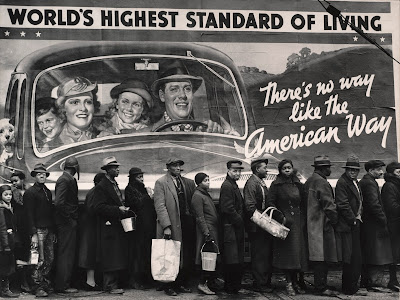By “we,” I mean America at-large. As for “nice things,” I don’t picture self-driving cars, hovercraft backpacks or laundry that does itself. Instead, I mean the basic aspects of a high-functioning society: well-funded schools, reliable infrastructure, wages that keep workers out of poverty, or a comprehensive public health system equipped to handle pandemics — things that equally developed but less wealthy nations seem to have.
In 2010, eight years into my time as an economic policy wonk at Demos, a progressive policy research group, budget deficits were on the rise. The Great Recession had decimated tax revenue, requiring more public spending to restart the economy.
But both the Tea Party and many in President Barack Obama’s inner circle were calling for a “grand bargain” to shrink the size of government by capping future public outlays and slashing Social Security, Medicaid and Medicare. Despite the still-fragile recovery and evidence that corporations were already paring back retirement benefits and ratcheting down real wages, the idea gained steam.
On a call with a group of all-white economist colleagues, we discussed how to advise leaders in Washington against this disastrous retrenchment. I cleared my throat and asked: “So where should we make the point that all these programs were created without concern for their cost when the goal was to build a white middle class, and they paid for themselves in economic growth? Now these guys are trying to fundamentally renege on the deal for a future middle class that would be majority people of color?”
Nobody answered. I checked to see if I was muted.
Finally, one of the economists breached the awkward silence. “Well, sure, Heather. We know that — and you know that — but let’s not lead with our chin here,” he said. “We are trying to be persuasive.”
The sad truth is that he was probably right. Soon, the Tea Party movement, harnessing the language of fiscal responsibility and the subtext of white grievance, would shut down the federal government, win across-the-board cuts to public programs and essentially halt the legislative function of the federal government for the next six years. The result: A jobless recovery followed by a slow, unequal economic expansion that hurt Americans of all backgrounds.
The anti-government stinginess of traditional conservatism, along with the fear of losing social status held by many white people, now broadly associated with Trumpism, have long been connected. Both have sapped American society’s strength for generations, causing a majority of white Americans to rally behind the draining of public resources and investments. Those very investments would provide white Americans — the largest group of the impoverished and uninsured — greater security, too: A new Federal Reserve Bank of San Francisco study calculated that in 2019, the country’s output would have been $2.6 trillion greater if the gap between white men and everyone else were closed. And a 2020 report from analysts at Citigroup calculated that if America had adopted policies to close the Black-white economic gap 20 years ago, U.S. G.D.P would be an estimated $16 trillion higher.
by Heather C. McGhee, NY Times | Read more:
Image: Margaret Bourke-White/The Life Picture Collection — Getty Images, via Art Resource, NY
[ed. It occurs to me that probably over half the country isn't old enough to remember a pro-active government, nimble enough to confront and solve the big problems of its day. Ever since Reagan in the 80s (government is not the solution to our problems; government is the problem), and hacks like Newt Gingrich and Grover Norquist (I'm not in favor of abolishing the government. I just want to shrink it down to the size where we can drown it in the bathtub) Republicans have been steadily strangling government's ability to function, increasing its inefficiencies, and thereby making their point retroactively. To see what good government can do, look no further than this example.]
